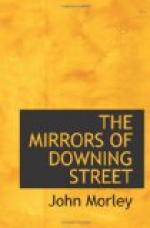It is a fortunate thing for this country that a man of so remarkable a genius for organization as Lord Inverforth should be found willing to serve the national interests in spite of an almost daily campaign of abuse directed against his administration. I sometimes wish he would bring an action for libel against one of these critics. It would be an amusing case. He might claim damages of, let us say, L7,000,000 or even L10,000,000, for he is a man of gigantic interests, claiming these damages on the score that his alleged libellers have injured his reputation as a man of business in all quarters of the world. They would have him the craziest muddler and the most easily swindled imbecile outside Fleet Street—where alone wisdom is to be found. How one would enjoy a verbatim report of the cross-examination of these critics in their own newspapers.
I will endeavour to show that Lord Inverforth is not quite so consummate an ass as his critics would have the public to believe, but rather one of the very greatest men, in his own particular line, who ever came to the rescue of a chaotic Government.
Let me not be supposed to insist that a great man of business is a great man. I regard Lord Inverforth as an exceedingly great man of business, one of the very greatest in the world, and this fact I hope to make clear in a few lines, but I do not regard him as a national hero in the wider sense of that term. He has too many lacks for that, and some of them essential to true and catholic greatness.
He could never fire the imagination of a people, nor does he convey a warm and generous feeling to the heart. His enthusiasms are all of a subdued nature. The driving force in his character which has made him so powerful a man of business, owes little to the higher virtues. He has found the plain of life too full of absorbing interest and too crowded with abounding opportunities for getting on to raise his eyes to the mountains. This is not to say that he is a man of no ideals, but to say that his ideals are of too practical and prosaic a kind ever to stir the pulses with excitement.
Nevertheless I regard him as a born statesman, and could wish that the conditions of political life made it more easy for a man of his gifts to serve the country than men with the gifts of, let us say, Dr. Macnamara or Sir Hamar Greenwood.
The world knows so little of him that perhaps I may begin my political reflections in this case with a brief summary of his career, such details of a business man’s biography as may contribute to an understanding of his character.
Andrew Weir, as he was in those days, went to school at Kirkcaldy, where he was chiefly notable for seeking information on more subjects than came under the jurisdiction of his pedagogue’s ferule. A benign Rosa Dartle might have been his godmother. He was for ever consulting encyclopaedias and books of reference. However badly he knew his Greek verbs or his Latin syntax he had a very shrewd and curious knowledge of the world when he left school at fifteen to enter the local branch of the Commercial Bank of Scotland.




